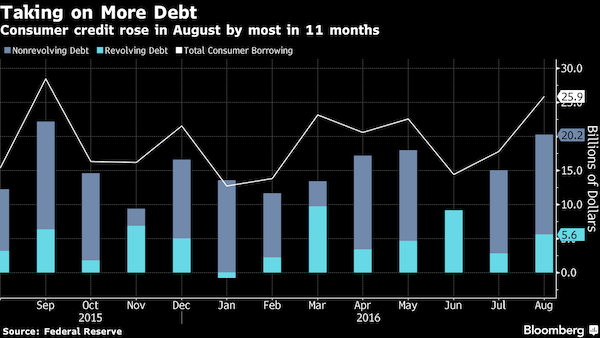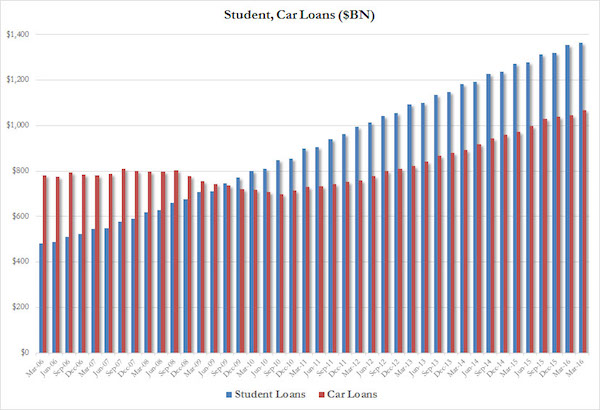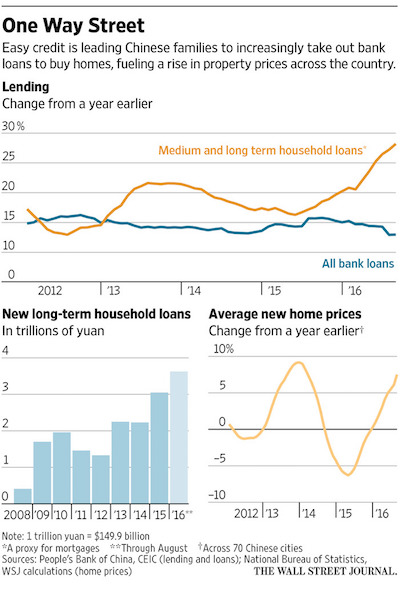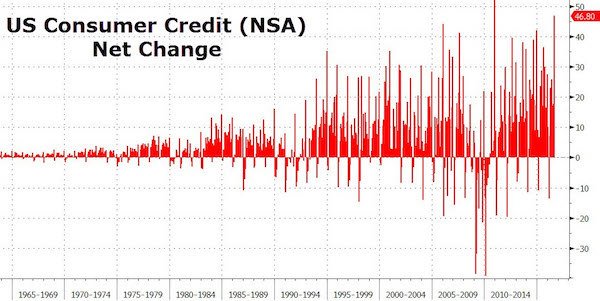
DPC Royal Street, New Orleans 1900

No deleveraging: Household debt rises 8.5% annualized.
• US Consumer Borrowing Rises by Most in Nearly a Year (BBG)
Household borrowing increased in August at the fastest pace in almost a year, led by a jump in loans for school and automobile purchases. The $25.9 billion increase, or an annualized 8.5%, followed a revised $17.8 billion gain the prior month, Federal Reserve figures showed Friday. The median projection called for a $16.5 billion advance. Non-revolving credit, which includes car and educational loans, also posted the largest advance since September of last year. Steady hiring and income growth may be making Americans more willing to borrow, helping to sustain consumer spending and the economic expansion.
Non-revolving credit increased $20.2 billion, while revolving debt rose $5.6 billion during the month, the Fed’s report showed. Lending by the federal government, mostly for student loans, climbed $18.7 billion in August on an unadjusted basis as students prepared to return to school for the fall semester. The Fed’s consumer credit report doesn’t track debt secured by real estate, such as home equity lines of credit and home mortgages.


Tyler on the household debt topic, delving a bit deeper, as in beyond seasonal adjustments.
• US Consumer Credit Has Second Biggest Jump On Record (ZH)
It will likely not come as a big surprise that at a time when US personal savings are once again declining, perhaps as a result of soaring health insurance costs, that US consumers are forced to borrow increasingly more to make ends meet. And, as expected, the latest consumer credit report confirmed this, when moments ago the Federal Reserve announced that in August, total US credit surged by $25.9 billion on a seasonally adjusted basis, smashing expectations of a $16.5 billion increase, and the third biggest monthly jump since 2001.[..] what was perhaps most interesting is that on a non-seasonally adjusted basis, when removing the artificial Arima-X-13 seasonal factors, August consumer credit soared by a near record $46.8 billion, an absolute outlier month, and surpassed just once in history.
So for all those who, still, erroneous claim that US consumers are deleveraging, show them this chart, because the scramble if not so much into revolving debt then certainly into government-funded auto and student loans, is unlike anything ever seen. And speaking of just those two kinds of debt, here they are broken out: they have both never been higher.


Last big jobs report before the elections (November’s will come too late to make much difference) is mixed, but certainly not very good.
• US Payrolls Up 156K, Missing Expectations, Unemployment Rate Rises To 5.0% (ZH)
With Wall Street all bulled up on the economy, expecting a print of 175K while the whipser number was decidedly higher, and closer to 200K thanks to Goldman’s optimism, moments ago the BLS reported that in September the US created only 156K jobs, missing expectations, and down from the upward revised 167K in August, leaving the question of whether the Fed will hike imminently, unanswered. However, offsetting the September miss, last month’s disappointing print of 151K was revised to 167K. At the same time, the change in total nonfarm payroll employment for July was revised down from +275,000 to +252,000. With these revisions, employment gains in July and August combined were 7,000 less than previously reported.
Over the past 3 months, job gains have averaged 192,000 per month. The household survey employment number of 151.968MM was 354K bigger than last month, and pushed the annual increase higher by 2.0%, the biggest since March 2016. The unemployment rate, at 5.0%, and the number of unemployed persons, at 7.9 million, changed little in September, up 0.1% from August and the highest in 6 months. Both measures have shown little movement, on net, since August of last year. The participation rate rose by 0.1% t 62.9% as people not in the labor force declined by 207K.

Which should make Britons very happy to leave that bunch of mobsters behind. Even if their own new ‘leaders’ are just as bad. But those you can vote out next time around.
• EU Leaders Line Up To Insist UK Will Pay A High Price For Brexit Stance (G.)
Britain and the EU appear more bitterly divided over Brexit than at any time since the referendum, with European leaders ramping up their rhetoric after Theresa May signalled she would seek a clean break with the bloc. The prime minister’s Conservative conference speech, in which she indicated Britain would prioritise immigration control and restore the primacy of UK law to become an “independent, sovereign nation” without full access to the single market, drew a sharp response from continental capitals. In Paris, François Hollande said Britain must suffer the consequences of its decision. “The UK has decided to do a Brexit. I believe even a hard Brexit,” he said. “Well, then we must go all the way through the UK’s willingness to leave the EU. We have to have this firmness.”
If not, “we would jeopardise the fundamental principles of the EU”, the French president said on Thursday night. “Other countries would want to leave the EU to get the supposed advantages without the obligations.. There must be a threat, there must be a risk, there must be a price.” Hollande’s message was underlined on Friday by the president of the European commission, Jean-Claude Juncker, who said the 27 remaining member states must not give an inch in exit negotiations. “You can’t have one foot in and one foot out,” he said. “We must be unyielding on this point.” Britain risked “trampling everything that has been built” over six decades of European integration, he said.
In Berlin, Angela Merkel rammed home the same point. “If we don’t insist that full access to the single market is tied to complete acceptance of the four basic freedoms, then a process will spread across Europe whereby everyone does and is allowed what they want.”

Turns out, globalization is just another religion. Hilarious that the CEO of United Parcel Service is quoted; yes, we understand they are all for ‘free’ trade, it’s what their business is based on.
• Worries Deepen That Globalization Is Hitting the Skids (WSJ)
Global finance ministers and central bankers are descending on Washington this week with a central concern in mind: fear that the modern age of globalization is hitting a wall. Last year’s $646 billion in foreign direct investment in rich economies represents a 40% drop from the peak before the financial crisis. International lending, as measured by cross-border banking claims at the Bank for International Settlements, is down nearly $2.6 trillion, or 9%, over the past two years. International trade this year will grow at the slowest pace since 2007, according to the World Trade Organization, which has slashed its forecast for growth in global trade volumes to 1.7% in 2016 from a previous estimate in April of 2.8%.
Imports among the world’s 20 largest economies have fallen as a share of their GDP for four consecutive years, and growth in demand for shipping containers fell to 4% this year after four decades of double-digit expansion. As financial officials gather in the U.S. capital this week at semiannual meetings of the IMF and the World Bank, there is widespread concern that this global malaise could worsen if nations intentionally turn inward. Too many politicians are backing trade barriers in a misguided effort to boost national growth in the short term, said Roberto Azevedo, director general of the WTO. “The medicine that is being often prescribed is protectionism, and that is exactly the kind of medicine that is going to hurt the patient, not help him,” he said.
The head of the IMF, Christine Lagarde, also expressed concern over rising protectionism around the world, including in the U.S. “Curbing free trade would be stalling an engine that has brought unprecedented welfare gains around the world over many decades,” she said. The slower-than-expected economic activity is feeding a cycle of banks pulling back from international risk, companies hesitant to invest in new production, and governments issuing regulations—often linked to national security—favoring domestic producers. “Now that we’re in this 2% [growth] range in the U.S. and less than that in other countries, people are clinging more to the past and thinking more how to protect versus embracing the future,” said David Abney, CEO of United Parcel Service.

“The reality speaks of morbid financial excess..” (BTW, two WSJ articles in a row that start with Worries, some that deepen, others grow -same thing)
• Worries Grow That China Faces a Perilous Property Bubble (WSJ)
The latest buying frenzy began late last year, when Mr. Xi set a national goal of reducing the number of unsold homes in 2016. In the following months, cities rushed to relax home-purchase curbs that were put in place to discourage speculation during the last housing boom. Beijing also made it easier for homebuyers to access credit. The Chinese leadership’s hope was that modest borrowing by families and individuals would boost property sales and cut inventory, aiding related industries such as construction that, all told, account for about a fifth of China’s gross domestic product. It hasn’t gone as planned. Too much investment went into housing, economists say, aided by a series of central-bank easing measures since late 2014.
Government data show more than a third of new loans in the first half of 2016 went to housing. By comparison, an average 17.4% of new loans went to housing between 2010 and 2015, according to BNP Paribas. “The reality speaks of morbid financial excess,” said Harrison Hu at RBS. In July, six major cities showed home-price gains of more than 20% from the prior year; in August, 10 cities did. In the coastal city of Xiamen, prices skyrocketed 44.3%. Average new home prices across 70 Chinese cities in August rose far less, 7.5%, suggesting that many smaller cities are still struggling with too much inventory.
Chinese households’ leverage, meanwhile, is fast rising to dangerous levels. A study by China’s Haitong Securities shows that total home loans are expected to make up 30% China’s GDP this year, up from less than 20% three years ago. That is higher than Japan’s level during its property-bubble years in the late 1980s. One moderating factor: Most Chinese households pay down payments equal to about a third of the home’s value, making homeowners less vulnerable to price drops.


Yeah, about that globalization thing… You know, protectionism and all that…
• EU Imposes Import Duties Of Up To 73.7% On Cheap Chinese Steel (G.)
The European Union has slapped tariffs of up to 73.7% on Chinese steel after manufacturers were forced to cut jobs due falling prices and demand for the material amid an influx of cheap imports from Asia. Thousand of job have already been lost in the steel industry in Britain in the last year with thousands more at risk as the sector remains under pressure. Industry leaders have partly blamed the squeeze on the sector on China’s dumping of cheap steel in Europe as it struggles to find buyers for its products domestically. The EU has agreed to impose import duties of between 13.2% and 22.6% on Chinese hot-rolled steel, which is used in pipelines and gas containers, and 65.1% and 73.7% on heavy plates, which are used in civil engineering projects.
The state of the steel industry became part of the debate about Britain’s future in the EU before the referendum in June, with Brexiters claiming that the country would be better able to protect workers and introduce tariffs on Chinese imports if it voted to leave. UK Steel, the industry trade body, welcomed the speed at which the new EU tariffs had been introduced but warned that the levy on hot-rolled steel was not high enough, which could hurt Port Talbot, the biggest steelworks in Britain. Dominic King, head of policy and external affairs at UK Steel, said: “The speed at which tariffs have been imposed on dumped steel from China by the EU is very welcome. However, while we hope the tariffs for heavy plate are robust enough to ensure free and fair trade, the proposed levels for hot-rolled steel are not high enough, which might encourage China to continue dumping it on to the EU market.”

I don’t think Trump will lose. But good perspective, from Canada.
• He’ll Likely Lose – But Trump Is The Final Warning To Elites (G&M)
Donald Trump will probably lose the election. But he is a final warning. Unless political elites of both the left and the right become more humble, unless they once again ask themselves how their agendas will play in Peoria, the next rough beast might slouch over the corpse of the republic. “Will it play in Peoria?” goes back to the days of vaudeville. The city of 115,000 in central Illinois was once considered the ultimate focus group, the embodiment of Middle America, the place to test a joke or a soda or a social policy to learn what white folks without a fancy degree thought of it. Back in the day, you knew better than to defy the settled judgment of this ultimate test market. You went as far as Peoria would let you, and no further.
But we grew impatient. You have to fight Jim Crow, whatever Peoria thinks. Free trade will lift most boats, even if it swamps a few. The environment is too precious, and at too much risk, to go slow. Lower taxes and less red tape will help the economy grow, even if it profits some more than others. The left wanted social justice, protection for minorities, a cleaner environment. The right wanted lower taxes and trade deals. Despite the rhetoric, each accommodated the other. Republicans left the Democrats’ progressive policies largely intact; Democrats learned to embrace, or at least reluctantly accept, globalization. And everybody knew what was really going on in Washington. A tax break for you. A subsidy for me. You take care of my client and I’ll take care of yours. Deal? Then let’s celebrate. We’ll expense it.
What did the guy on the line think about this? The wife at Wal-mart? The folks at the ball park? No one really cared. Yeah, politicians chased their vote. But respect them, even defer to their collective wisdom? Not so much. The accommodation between left and right started unravelling in the 1980s. The Bork confirmation. The Thomas confirmation. Contract with America. Impeaching Bill Clinton. Iraq. Obama. The Tea Party. Gay marriage. And now the Democrats want to replace a black president with a woman? A CLINTON? Meanwhile, Peoria is hurting. The city is home to Caterpillar. But the heavy-equipment giant has outsourced most of its work force overseas or to so-called right-to-work states.
But what does Washington care? The left worries more about combatting global warming than about blue-collar workers with bad backs and no jobs. The right promises to retrain them, but somehow never gets around to it. The laid-off boys in the bars of Peoria blame the illegals, the only ones even more voiceless than themselves. They seethe at the Wall Street suits who destroyed the economy and got off scot-free. And what the hell is transgender, anyway? They look at their daughter’s report card. She’s only getting Cs. What future is there for anyone who’s only getting Cs?

How wrong is Dlibert’s alter ego? “It is fair to assume that Bill and Hillary are about to experience the worst weeks of their lives.”
• Why Does This Happen on My Vacation? -The Trump Tapes (Scott Adams)
By now you know about the Access Hollywood recording in which Donald Trump said bad things eleven years ago. Many of my readers asked me to weigh in. I’ll give you my thoughts, in no particular order.
1. If this were anyone else, the election would be over. But keep in mind that Trump doesn’t need to outrun the bear. He only needs to outrun his camping buddy. There is still plenty of time for him to dismantle Clinton. If you think things are interesting now, just wait. There is lots more entertainment coming.
2. This was not a Trump leak. No one would invite this sort of problem into a marriage.
3. I assume that publication of this recording was okayed by the Clinton campaign. And if not, the public will assume so anyway. That opens the door for Trump to attack in a proportionate way. No more mister-nice-guy. Gloves are off. Nothing is out of bounds. It is fair to assume that Bill and Hillary are about to experience the worst weeks of their lives.
4. If nothing new happens between now and election day, Clinton wins. The odds of nothing new happening in that timeframe is exactly zero.
5. I assume that 75% of male heads of state, including our own past presidents, are total dogs in their private lives. Like it or not, Trump is normal in that world.
6. As fictional mob boss Tony Soprano once said in an argument with his wife, “You knew what you were getting when you married me!” Likewise, Trump’s third wife, Melania, knew what she was getting. It would be naive to assume Trump violated their understanding.
7. Another rich, famous, tall, handsome married guy once told me that he can literally make-out and get handsy with any woman he wants, whether she is married or not, and she will be happy about it. I doubted his ridiculous claims until I witnessed it three separate times. So don’t assume the women were unwilling. (Has anyone come forward to complain about Trump?)
8. If the LGBTQ community wants to be a bit more inclusive, I don’t see why “polyamorous alpha male serial kisser” can’t be on the list. If you want to label Trump’s sexual behavior “abnormal” you’re on shaky ground.
9. Most men don’t talk like Trump. Most women don’t either. But based on my experience, I’m guessing a solid 20% of both genders say and do shockingly offensive things in private. Keep in mind that Billy Bush wasn’t shocked by it.
10. Most male Hollywood actors support Clinton. Those acting skills will come in handy because starting today they have to play the roles of people who do not talk and act exactly like Trump in private.
11. I’m adding context to the discussion, not condoning it. Trump is on his own to explain his behavior.
12. Clinton supporters hated Trump before this latest outrage. Trump supporters already assumed he was like this. Independents probably assumed it too. Before you make assumptions about how this changes the election, see if anyone you know changes their vote because of it. All I have seen so far is people laughing about it.
12. I hereby change my endorsement from Trump to Gary Johnson, just to get out of the blast zone. Others will be “parking” their vote with Johnson the same way. The “shy Trump supporter” demographic just tripled.
13. My prediction of a 98% chance of Trump winning stays the same. Clinton just took the fight to Trump’s home field. None of this was a case of clever strategy or persuasion on Trump’s part. But if the new battleground is spousal fidelity, you have to like Trump’s chances.
14. Trump wasn’t running for Pope. He never claimed moral authority. His proposition has been that he’s an asshole (essentially), but we need an asshole to fight ISIS, ignore lobbyists, and beat up Congress. Does it change anything to have confirmation that he is exactly what you thought he was?

Stop bombing teh Middle East and send your troops to protect Afrian wildlife. Much better use of force. May actually save mankind instead of destroying it.
• Hounds Hot On The Heels Of Poachers In Rhino Country (G.)
“I am ready to die for conserving the rhino,” says Wisdom Makhubele. But the brave young ranger now has another weapon in the war against rhino poaching: the extraordinary nose of tracking hounds. The trained dogs can run poachers to ground far faster than people, sometimes even being set free in packs and followed from helicopters. The new canine training unit at the Southern African Wildlife College (SAWC), near Acornhoek, opened earlier this year and dogs have already brought armed poachers to heel in Kruger national park, the epicentre of the rhino poaching crisis. At least 6,000 African rhinos have been slaughtered by poachers since 2008, to fuel the soaring demand for its horn in Asia, where it is highly valued as a supposed tonic and status symbol.
The rhino poaching epidemic across Africa has exploded in recent years, with annual increases in killings every year since 2009: 1,338 were slaughtered in 2015. It was a hot topic at the major wildlife trade summit in Johannesburg this week, where an attempt by Swaziland to legalise rhino horn trade was defeated. South Africa hosts more than 90% of the 20,000 surviving white rhinos and almost half the 4,800 remaining black rhinos and saw a slight dip in the slaughter in 2015, the first decrease in nine years. Over 70% of the rhino kills occur in Kruger and a sign on the way into the park reads “Poachers will be poached”. Dogs have been used for camp security for years, but the escalating poaching crisis has found them a new role.
“They are awesome – they are instinctive to tracking,” says Johan van Straaten, manager of the dog unit, which has been funded by WWF Nedbank Green Trust. “All these dogs can track, it’s in their genes. But we train them to track the scent we want. These dogs are imprinted on human scent, like narcotics dogs are on drugs.” [..] Being a ranger in the war on poaching can be deadly – more than 1,000 rangers were killed around the world in the last decade and many more injured. The danger follows the rangers home too. “They are targets and their families can be targets, that’s for certain,” says van Straaten. Makhubele comes from a local village. “People there know me and some of them are poachers, but I am not afraid,” he says. “This [rhino population] is our legacy and we have to look after it.”

New Zealanders must stand up against their government. It’s very much your shame too.
• New Zealand Child Poverty A Source Of Deep Concern: UN (G.)
The UN has said in a damning report that it is deeply concerned about New Zealand’s persistently high rates of child poverty. Unicef says 300,000 children – a third of New Zealand’s child population – now live below the poverty line. This is a rise of 45,000 in a year. Government representatives travelled to Geneva last month to present the country’s progress on its commitment to protecting the rights of the child to the UN. The UN committee’s report acknowledges widespread public debate and media attention on child poverty in New Zealand, but expresses serious concern about the government’s failure to address the issue systematically.
“The committee is deeply concerned about the enduring high prevalence of poverty among children,” the report says, highlighting “the effect of deprivation on children’s right to an adequate standard of living and access to adequate housing, with its negative impact on health, survival and development, and education”. The report expresses particular concern about the number of Maori and Pasifika children living in deprived circumstances. Both groups are disproportionately represented in child poverty statistics.
It calls for “urgent measures to address disparities in access to education, health services and a minimum standard of living for Maori and Pasifika children and their families” and says more effort should be invested in preserving Maori children’s cultural identity. The government of the National party is urged to take a systematic approach to tackling child poverty, and to establish a “national definition” to measure child poverty, something it has repeatedly refused to do. The Green party co-leader Metiria Turei welcomed the UN report. “The national government has repeatedly denied the seriousness of the problem and deserves the criticism it has received from the committee,” she said. “And that means thousands on NZ children are missing out on their chance for a decent life, especially Maori and Pasifika children.”

What is more sickening, that the Saudis do this, or that we insist on continuing to call them our friends? “..the stoning, amputation and flogging of children..” does not belong in our world.
• UN Watchdog Demands Saudis Stop Child Executions (AFP)
UN rights experts demanded Friday that Saudi Arabia immediately overturn laws allowing for the execution of children, and for punishments of minors including stonings, amputations and flogging. In a report on the plight of children in the wealthy Gulf state, a UN committee took Riyadh to task for allowing minors to be sentenced as adults, including to harsh corporal punishment and even the death penalty. The United Nations Committee on the Rights of the Child also criticised what it called Saudi Arabia’s systematic discrimination against girls, who are not considered full subjects, and who can be married off as early as nine years of age.
In its report, the committee expressed its “deepest concern” that Saudi Arabia “tries children above 15 years as adults and continues to sentence to death and to execute persons for offences that they allegedly committed when they were under the age of 18”. The committee, which is composed of 18 independent experts who monitor the implementation of the UN Convention on the Rights of the Child, pointed to a number of cases where minors had been sentenced to death. It said that at least four of the 47 people executed on January 2 this year were under 18 when they were sentenced to death.
And it demanded that Riyadh “immediately halt the execution” of those currently on death row who allegedly committed their crimes when they were minors, including Ali Mohammed Baqr al-Nimr, Abdullah Hasan al-Zaher, and Salman Bin Ameen Bin Salman Al-Qureish. Committee chairman Benyam Mezmur told reporters Saudi Arabia was only one of five countries, alongside China, Iran, Pakistan, and the Maldives, where child rights experts had ever needed to raise concerns about executions. “This is a very, very serious issue,” he said. The committee also demanded that Saudi Arabia immediately repeal laws permitting “the stoning, amputation and flogging of children”.









